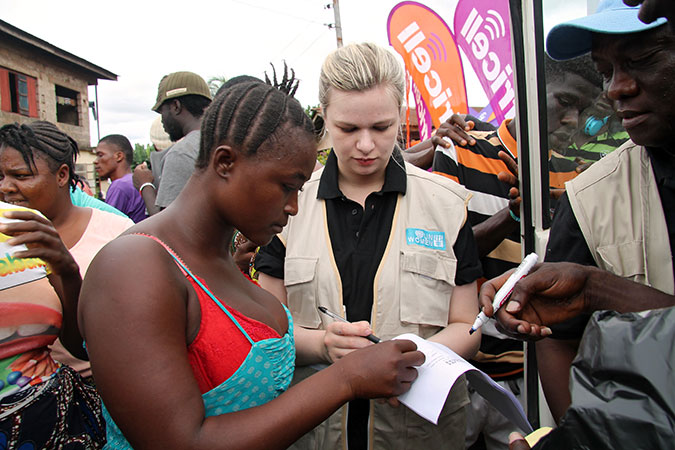Sierra Leone Mudslides: Making sure humanitarian aid reaches women
Date:

Following heavy rains on 14 August, mudslides have left more than 400 people dead and an estimated 6,000 affected in Freetown, the capital of Sierra Leone. The number of people in need of humanitarian aid is expected to rise as rain and floods continue.
Women and girls are often disproportionately impacted during times of crises. They have unique health and hygiene needs, and shoulder increased burden of work, caring for children, the sick and the elderly. They are also rendered more vulnerable to violence and exploitation, particularly in environments where gender-based violence rates are already high, such as in Sierra Leone. Many women and girls in Freetown already lived in poverty and precarious circumstances.
UN Women is leveraging its partnerships to ensure women’s leadership in humanitarian response in Sierra Leone and to meet the urgent gender-based needs of the affected population.
“Our boots are fully on the ground. We were among the first ones to be there, and we are ensuring that humanitarian assistance immediately reaches women,” said Mary Okumu, UN Women Representative in Sierra Leone.
UN Women is also providing women with dignity kits, which contain basic health and hygiene products for displaced women and girls, such as soap, underwear and sanitary napkins.
Making humanitarian action work for women also requires ensuring that women’s voices and experiences are incorporated in planning recovery assistance, as women are often the first responders and caregivers in their households and communities.
In addition to distributing dignity kits, UN Women is also preparing to provide economic opportunities for women in temporary shelters, allowing them to earn an income for themselves and their families. Three empowerment hubs will be set up in affected communities, where one-stop centres will provide safe spaces for 1,000 women to convene, seek psychosocial support and access information and critical services, such as cash-for-work programmes.
UN Women is also working with the Government and other humanitarian partners, including the World Food Programme (WFP), UN Population Fund (UNFPA) and UNICEF, as well as local women’s organizations, to ensure that the gendered needs of women and girls are factored into the overall humanitarian response.
UN Women’s humanitarian response in Sierra Leone is part of the Women’s Leadership, Empowerment, Access and Protection in Crisis Response (LEAP) programme, which builds on UN Women’s experience from 35 countries across the world. In 2016 alone, UN Women served 125,000 displaced women and girls in complex humanitarian settings.